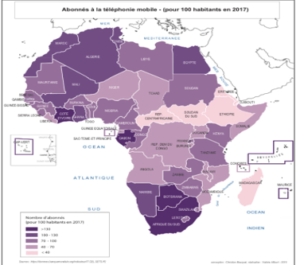The Tech Intelligence series explores various tech topics: cloud, cybersecurity, blockchain. Today, discover a quick overview of digital development on the African continent.
Putting everything on telephony: a winning strategy for digital development in Africa?

In 2020, the number of mobile users in Africa is estimated at over 700 million across the continent. However, this is not a uniform reality across the continent: the number of mobile subscribers in 2017 per 100 inhabitants varies by continent. It is very high in the Maghreb countries, West and Southern Africa. However, it remains very low for Central and East Africa.
What needs to be understood is that the mobile network is the primary means of accessing the internet in Africa. More than half of the connections are made through mobile telephony. And many companies capitalize on this phenomenon.
African Leaders in Digital?
Leaders in the field of digital and telephony do not change from one continent to another.
Take the example of Jumia, a leader in e-commerce sites, present in most parts of the continent, akin to Amazon. The company has created a digital meeting place between supply and demand and also offers logistics and payment services (payment by SMS, for example).
However, this company was created in Berlin by French founders, its technical headquarters are in Portugal, and its capital is mainly Western.
It is a fact that the economic leaders of the African continent are foreigners. If we look at mobile telephony, the leader MTN, a South African operator, often finds itself in competition with European operators (Orange or Vodafone).
This trend is also observable in the installation of communication antennas. With an additional peculiarity, as we also find Chinese companies such as Huawei or ZTE.
However, this predominance of foreigners in the African digital market can quickly evolve. Indeed, many countries are adopting public policies to create digital clusters in the hope of emerging 100% African companies.
Major African Digital Clusters
Combining private and public capital, many economic zones have emerged in certain African countries. In obvious cooperation with American, European, and Chinese companies.
Some examples:
- In Morocco: the E-Medina cluster. Created in 2013 in Casablanca, this cluster of companies and public services aims to be a "smart-city", an ecosystem connecting numerous companies from different sectors to strengthen synergies.
- In Ghana: Google's AI Research Center. With the association of digital companies, Google has opened its R&D center on AI in Accra. A move that follows the creation in 2012 of the African Institute for Mathematics in cooperation with BlackBerry and MasterCard. This center focuses on weather forecasting algorithms and disease detection as many African GDPs depend on Agriculture.
- In Kenya: Konza Technopolis. This is a digital hub that brings together digital giants: GAFAM, IBM, Nokia, Samsung ... Also called the Silicon Savannah, this hub has spawned 250 startups, universities, and incubators. It is through the presence of foreign giants that many African entrepreneurs come to take advantage of the opportunities created.
-
In Nigeria: Yabacon Valley. In Lagos, the city with 22 million inhabitants, we find a cluster similar to that of Kenya. It is through the installation of GAFAM and other digital giants that many startups have emerged. The large groups attract qualified individuals who then decide to embark on the entrepreneurship adventure. This is the case with the company Jobberman, the largest website for finding a job in Sub-Saharan Africa.
It is often along the Atlantic coasts that digital clusters appear. This is explained by the arrival of undersea cables from the global internet network. Digital companies settle as close as possible to access to information.
In Cotonou, Benin, the city hosts the Beninese Smart City because it is very close to the arrival of the cables.
Digital as a Growth Accelerator in Africa
According to Rima Le Coguic, Head of the Transport, Telecoms and Sustainable Energy Division at the French Development Agency (AFD), "digital innovation allows Africa to leapfrog development trajectories by strengthening social and financial inclusion and becoming a engine of growth and employment".
Indeed, Africa initially focused on building a mobile rather than fixed telephone network. This facilitates connections between individuals while enhancing their mobility.
Digital is also found in public education policies through e-learning. For example, Africa Code Week in 2016 taught 426,000 young people from 30 African countries the basics of programming. By targeting an increasingly growing youth population, Africa can change the nature of its problems.
It is also a remedy for the volatility of the banking system. Many companies have been created around online and mobile phone payments. The example of Mobile Money is proof of this. Indeed, MTN mobile money, Orange money, Moov money, Airtel mobile money, etc. offer the ability to link your phone number to your bank account to make payments.
These efforts are bearing fruit as it is estimated that young African startups raised $550 million in 2017.
Digital in Africa: a Sector Facing Constraints
To connect the African population and accelerate digital opportunities, countries have no choice but to rely on the capital and expertise of foreign powers to build telephony networks, install 4G antennas, or deploy fiber optics on the continent.
African countries must borrow, and the risk of insolvency (due to political instability and commodity price volatility) slows investments in this area. At the same time, China (Africa's largest trading partner) has been pursuing a massive investment policy on the continent for 10 years. Recently, Senegal inaugurated a data center project in Diamniadio in cooperation with Huawei.



